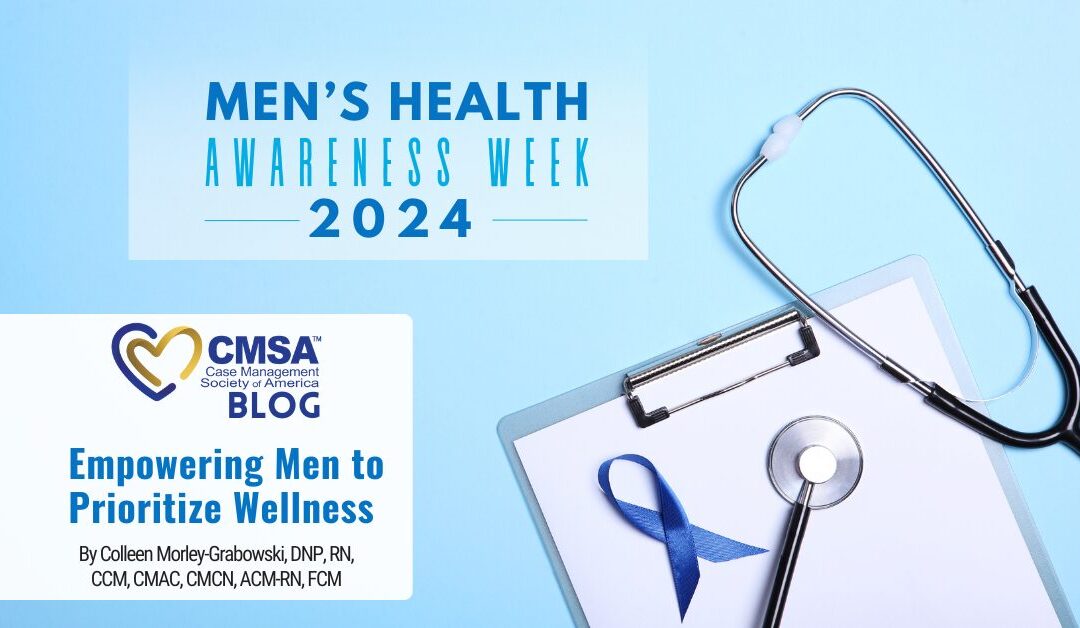By Colleen Morley-Grabowski, DNP, RN, CCM, CMAC, CMCN, ACM-RN, FCM
June 10-16, 2024, marks the celebration of Men's Health Week, a time dedicated to raising awareness of men's health issues and encouraging men to prioritize their well-being. This annual event provides an opportunity to start conversations about men's unique health challenges and promote healthy lifestyle choices.
Men's health is often surrounded by misconceptions and stereotypes that can impact their well-being. Let's look at some common issues men face in their healthcare journeys.
1. Seeking Help is a Sign of Weakness: One of the most pervasive myths surrounding men's health is the belief that seeking Help is a sign of weakness. In reality, asking for Help is a sign of strength and courage. Men are more likely to avoid seeking medical care due to fears of being perceived as weak or vulnerable, as well as concerns about cost and inconvenience. However, this reluctance is based on harmful myths and stereotypes that ultimately cost men more in terms of healthcare costs, decreased enjoyment of life, and a shorter lifespan.
2. Misunderstandings About Sexual Health Issues: There are several misconceptions or misunderstandings about erectile dysfunction that may cause some men to forgo treatment. One such misconception is the belief that erectile dysfunction only affects older men. In reality, it can occur at any age. Many treatment options are available, including medications, mechanical devices, surgery, and counseling.
3. Inappropriate Use of Testosterone Supplements: There is a misconception surrounding testosterone supplements, with some believing that higher-than-average testosterone levels are always beneficial. However, failing to address low testosterone can increase the risk of osteoporosis, heart disease, and depression. It's important to use testosterone supplements under the care of a medical professional, as they can have adverse health implications in some cases.
4. Mental Health Misconceptions: Men sometimes experience depression as anger or irritability rather than sadness, leading to the misconception that they are not affected by depression. This can result in men sweeping their feelings under the rug and not seeking Help. It's crucial to recognize that mental health issues can manifest differently in men and to encourage open conversations about mental well-being.
5. Gender Inaccuracies: There are gender inaccuracies that affect men's health, such as the belief that men primarily rely on sex for emotional fulfillment. In reality, men long for real solidarity with their partners and rely on emotional connections for a happier and healthier life. Encouraging men to reveal their true feelings and seek emotional support is crucial for their well-being.
These misconceptions can contribute to men neglecting their health needs and avoiding seeking necessary medical care. By debunking these myths and promoting evidence-based information, we can encourage men to take control of their health and well-being. It's essential to foster an environment where men feel empowered to prioritize their health and seek support.
Men's Health Week 2024 is a powerful reminder to prioritize men's health and well-being. It encourages men to take charge of their health, seek their support, and make positive lifestyle changes. This observance aims to empower men to lead healthier and happier lives. Let's use this week to spark conversations, promote healthy habits, and inspire men to embrace a proactive approach to their health. Together, we can work towards a healthier future for men everywhere.
Couldn’t make it to Providence for #CMSA2024? No problem! Register for our digital component (59 CE Hours) and enjoy access to all main conference concurrent sessions: ![]() https://cmsa.societyconference.com/ Digital access remains open for viewing and evaluating until July 31—Maximize your CE earnings from your home or office!
https://cmsa.societyconference.com/ Digital access remains open for viewing and evaluating until July 31—Maximize your CE earnings from your home or office!
Bio: Dr. Colleen Morley-Grabowski, DNP, RN, CCM, CMAC, CMCN, ACM-RN, FCM is the Associate Chief Clinical Operations Officer, Care Continuum for University of Illinois Health System and the current President of the Case Management Society of America National Board of Directors. She has held positions in acute care as Director of Case Management at several acute care facilities and managed care entities in Illinois, overseeing Utilization Review, Case Management and Social Services for over 14 years; piloting quality improvement initiatives focused on readmission reduction, care coordination through better communication and population health management. Her current passion is in the area of improving health literacy. She is the recipient of the CMSA Foundation Practice Improvement Award (2020) and ANA Illinois Practice Improvement Award (2020) for her work in this area. Dr. Morley also received the AAMCN Managed Care Nurse Leader of the Year in 2010 and the CMSA Fellow of Case Management designation in 2022. Her 1st book, “A Practical Guide to Acute Care Case Management”, published by Blue Bayou Press was released in February, 2022. Dr. Morley has over 20 years of nursing experience. Her clinical specialties include Med/Surg, Oncology and Pediatric Nursing. She received her ADN at South Suburban College in South Holland, IL; BSN at Jacksonville University in Jacksonville, FL, MSN from Norwich University in Northfield, VT and her DNP at Chamberlain College of Nursing.


Losts of important information. Thanks Colleen